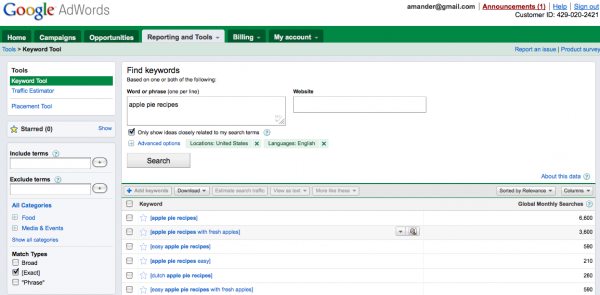Easy SEO techniques for titling a blog, naming a product or writing headlines for a landing page
If a blog or sales letter is never found in a search engine, does it even exist? If that same blog or sales letter doesn’t speak the same language as its target audience, does it make a sound?
Think about these two things for a minute.
If you’re spending all of this time writing and launching a landing page, don’t you think it would be worth a little extra time to make sure the only light of day it sees isn’t through a tab on your website, or through your selective email list?
Keyword research, in its simplest form, is easy.
Do a simple test right now.
Here is the most simple SEO recipe you can use to find targeted keywords for your blog or sales letter landing page. If you want to know why it’s done this way, take a look at the plethora of free SEO white papers we offer that have much more room to explain.
- Go to the Google Adwords keyword tool: https://adwords.google.com/select/KeywordToolExternal
- Type in the keyword phrase that your product is about. Let’s say we want to write about apple pie recipes, and we have ten of them. So we type in “apple pie recipes”.
- The results list that you’ll get, will give you all of the most searched for terms that are related to “apple pie recipes”.

[text_ad]
- You’ll see in the results that “apple pie recipes” has 6,600 people searching for this exact phrase every month, meaning that there are 79,200 searches per year. (Notice that we chose [Exact] in the “Match Types” section on the left).
- Go to Google.com and type in “apple pie recipes” in quotes. We Google in quotes because it gives us a more accurate future prediction since Google is more likely to rank an exact keyword than one that is jumbled. Below the search box, you will see that there are 68,000 other pages in Google competing for that exact phrase.

- Divide the 79,200 searches per year by the 68,600 pages and you’ll get a KCI (Keyword Competitive Index) of 1.16. We consider anything over 1 a good KCI, so this is great. There are more people searching for it, than there are pages competing for it.However, a nicely SEO’d page is only as good as the inbound links it has coming to it. A blog post or landing page without any inbound links may put more emphasis on thinking about those 68,000 pages it has to compete with. So we try to go more niche.
- At this current time, “apple pie recipes with fresh apples” has 26,800 competing pages and 43,200 searches per year. Better, but “easy apple pie recipes with fresh apples” has 7,080 people searches per year and there are only 8 pages competing.

- Now is when you make your decision. Would you rather try ranking for “apple pie recipes” when you have a 1 in 68,600 chance of getting ranked on page one in Google? Or will you take the 7,080 searches per year and get a guaranteed ranking on page one with “easy apple pie recipes with fresh apples”?
- I’ll make it easy for you; You want to choose “easy apple pie recipes with fresh apples” because it’s practically guaranteed that you’ll get ranked. So now the name of your product, article or sales letter headline is easy: “10 Easy Apple Pie Recipes with Fresh Apples”.
- Now do the same thing to find a subhead for your blog article, sales letter or product..
- BAM! You have two niche keyword phrases that you can use throughout whatever it is that you’re writing.
Myself and thousands of other online marketers use this method, or a method similar to it every time we write a blog post, write a landing page or come up with a title for a product.
If you’re already creating amazing products and blogs that get tons of inbound traffic and social mention, then that’s great. Imagine how much more traffic you’d be getting if you optimized their titles with keywords that people found all on their own when they used a search engine.
Inbound links and buzz are short-lived. Organic SEO is forever.



Great illustration Amanda. Such a helpful tip in discovering niche terms an audience is searching for.
Great example… a little extra work to echo back what users are looking for in Google and the author builds their own qualified traffic… no marketers or seo experts required!
Don